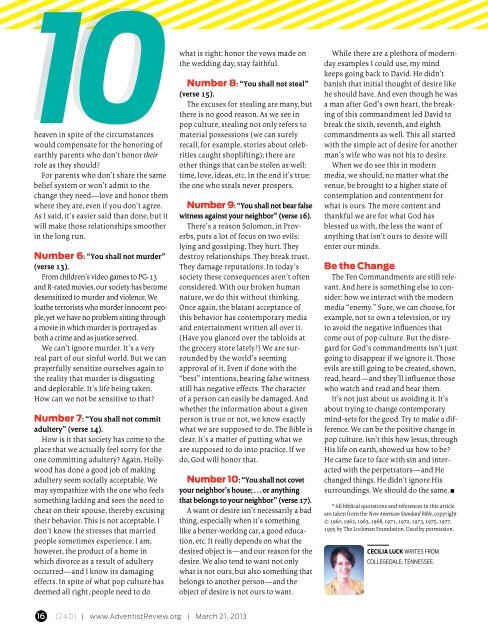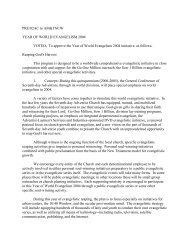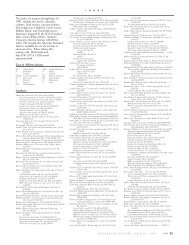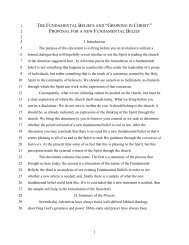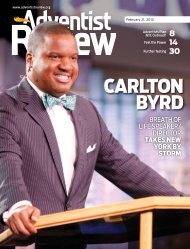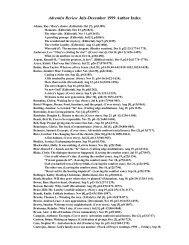Download PDF - Adventist Review
Download PDF - Adventist Review
Download PDF - Adventist Review
Create successful ePaper yourself
Turn your PDF publications into a flip-book with our unique Google optimized e-Paper software.
heaven in spite of the circumstances<br />
would compensate for the honoring of<br />
earthly parents who don’t honor their<br />
role as they should?<br />
For parents who don’t share the same<br />
belief system or won’t admit to the<br />
change they need—love and honor them<br />
where they are, even if you don’t agree.<br />
As I said, it’s easier said than done, but it<br />
will make those relationships smoother<br />
in the long run.<br />
Number 6: “You shall not murder”<br />
(verse 13).<br />
From children’s video games to PG-13<br />
and R-rated movies, our society has become<br />
desensitized to murder and violence. We<br />
loathe terrorists who murder innocent people,<br />
yet we have no problem sitting through<br />
a movie in which murder is portrayed as<br />
both a crime and as justice served.<br />
We can’t ignore murder. It’s a very<br />
real part of our sinful world. But we can<br />
prayerfully sensitize ourselves again to<br />
the reality that murder is disgusting<br />
and deplorable. It’s life being taken.<br />
How can we not be sensitive to that?<br />
Number 7: “You shall not commit<br />
adultery” (verse 14).<br />
How is it that society has come to the<br />
place that we actually feel sorry for the<br />
one committing adultery? Again, Hollywood<br />
has done a good job of making<br />
adultery seem socially acceptable. We<br />
may sympathize with the one who feels<br />
something lacking and sees the need to<br />
cheat on their spouse, thereby excusing<br />
their behavior. This is not acceptable. I<br />
don’t know the stresses that married<br />
people sometimes experience. I am,<br />
however, the product of a home in<br />
which divorce as a result of adultery<br />
occurred—and I know its damaging<br />
effects. In spite of what pop culture has<br />
deemed all right, people need to do<br />
what is right: honor the vows made on<br />
the wedding day, stay faithful.<br />
Number 8: “You shall not steal”<br />
(verse 15).<br />
The excuses for stealing are many, but<br />
there is no good reason. As we see in<br />
pop culture, stealing not only refers to<br />
material possessions (we can surely<br />
recall, for example, stories about celebrities<br />
caught shoplifting); there are<br />
other things that can be stolen as well:<br />
time, love, ideas, etc. In the end it’s true:<br />
the one who steals never prospers.<br />
Number 9: “You shall not bear false<br />
witness against your neighbor” (verse 16).<br />
There’s a reason Solomon, in Proverbs,<br />
puts a lot of focus on two evils:<br />
lying and gossiping. They hurt. They<br />
destroy relationships. They break trust.<br />
They damage reputations. In today’s<br />
society these consequences aren’t often<br />
considered. With our broken human<br />
nature, we do this without thinking.<br />
Once again, the blatant acceptance of<br />
this behavior has contemporary media<br />
and entertainment written all over it.<br />
(Have you glanced over the tabloids at<br />
the grocery store lately?) We are surrounded<br />
by the world’s seeming<br />
approval of it. Even if done with the<br />
“best” intentions, bearing false witness<br />
still has negative effects. The character<br />
of a person can easily be damaged. And<br />
whether the information about a given<br />
person is true or not, we know exactly<br />
what we are supposed to do. The Bible is<br />
clear. It’s a matter of putting what we<br />
are supposed to do into practice. If we<br />
do, God will honor that.<br />
Number 10: “You shall not covet<br />
your neighbor’s house; . . . or anything<br />
that belongs to your neighbor” (verse 17).<br />
A want or desire isn’t necessarily a bad<br />
thing, especially when it’s something<br />
like a better-working car, a good education,<br />
etc. It really depends on what the<br />
desired object is—and our reason for the<br />
desire. We also tend to want not only<br />
what is not ours, but also something that<br />
belongs to another person—and the<br />
object of desire is not ours to want.<br />
While there are a plethora of modernday<br />
examples I could use, my mind<br />
keeps going back to David. He didn’t<br />
banish that initial thought of desire like<br />
he should have. And even though he was<br />
a man after God’s own heart, the breaking<br />
of this commandment led David to<br />
break the sixth, seventh, and eighth<br />
commandments as well. This all started<br />
with the simple act of desire for another<br />
man’s wife who was not his to desire.<br />
When we do see this in modern<br />
media, we should, no matter what the<br />
venue, be brought to a higher state of<br />
contemplation and contentment for<br />
what is ours. The more content and<br />
thankful we are for what God has<br />
blessed us with, the less the want of<br />
anything that isn’t ours to desire will<br />
enter our minds.<br />
Be the Change<br />
The Ten Commandments are still relevant.<br />
And here is something else to consider:<br />
how we interact with the modern<br />
media “enemy.” Sure, we can choose, for<br />
example, not to own a television, or try<br />
to avoid the negative influences that<br />
come out of pop culture. But the disregard<br />
for God’s commandments isn’t just<br />
going to disappear if we ignore it. Those<br />
evils are still going to be created, shown,<br />
read, heard—and they’ll influence those<br />
who watch and read and hear them.<br />
It’s not just about us avoiding it. It’s<br />
about trying to change contemporary<br />
mind-sets for the good. Try to make a difference.<br />
We can be the positive change in<br />
pop culture. Isn’t this how Jesus, through<br />
His life on earth, showed us how to be?<br />
He came face to face with sin and interacted<br />
with the perpetrators—and He<br />
changed things. He didn’t ignore His<br />
surroundings. We should do the same. n<br />
* All biblical quotations and references in this article<br />
are taken from the New American Standard Bible, copyright<br />
© 1960, 1962, 1963, 1968, 1971, 1972, 1973, 1975, 1977,<br />
1995 by The Lockman Foundation. Used by permission.<br />
Cecilia Luck writes from<br />
Collegedale, Tennessee.<br />
16 (240) | www.<strong>Adventist</strong><strong>Review</strong>.org | March 21, 2013


